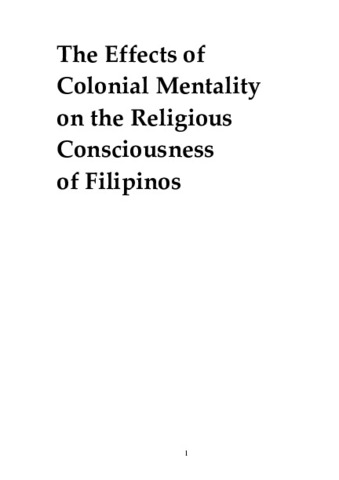Показать сокращенную информацию
The effects of colonial mentality on the religious consciousness of Filipinos
| dc.contributor.author | Diesto, Genaro Depakakibo Jr. | |
| dc.date.accessioned | 2022-01-11T07:16:23Z | |
| dc.date.available | 2022-01-11T07:16:23Z | |
| dc.date.issued | 2011 | |
| dc.identifier.citation | Diesto, G. D. , Jr. (2011). The effects of colonial mentality on the religious consciousness of Filipinos. Iloilo City: College of Theology, Central Philippine University. | en_US |
| dc.identifier.uri | https://hdl.handle.net/20.500.12852/1855 | |
| dc.description | Full text book This book is originally a dissertation of the author for his Ph.D. in Intercultural Studies at Fuller Theological Seminary, School of World Mission, in Pasadena, California, United States. | en_US |
| dc.description.abstract | This dissertation describes and analyzes the effects of Filipino colonial mentality on the religious consciousness of the Filipino people in general, and on the constituency of the Convention of Philippine Baptist Churches (CPBC) in particular. The research shows how the low self-image that results from colonial mentality continues to exert a negative influence on Philippine society and culture as a whole, and, more specifically, on the theology and practice of Filipino Christians. The study outlines the historical factors that were responsible for the emergence of this colonial mentality. It points out that the emergence of said mentality is a direct result of the interplay of the divergent cultural systems that, by historical accident, have become part of the socio-historical milieu of the Philippines. Utilizing the perspectives of cultural anthropology and worldview theory, the study examines the interaction between those cultures and the resultant changes on the Filipino worldview. The dissertation describes the role of Christian missions as agents of colonial policy. It shows that the Filipino churches, as products of those missions, still perpetuate colonial attitudes and practices that reinforce such mentality to the present. The result is Christianity that remains alien to the Filipino culture. Using insights gained from post-colonial studies and ethnohistory, the dissertation develops a critique of colonialism and the various missionary enterprises in the country. It proposes historical demystification, decolonization, and reeducation as conceptual tools for the development of a Filipino counter-consciousness that would serve as a corrective to the colonial captivity of the Filipino mind. Constructively, the dissertation suggests that by using traditional Filipino values to communicate the Christian gospel, the obstacle of colonial mentality can be more effectively dealt with in the process of elaborating a contextualized Filipino expression of the Christian faith. | en_US |
| dc.format.extent | 330 pages | en_US |
| dc.language.iso | en | en_US |
| dc.publisher | College of Theology, Central Philippine University | en_US |
| dc.subject.lcsh | Philippines--History | en_US |
| dc.subject.lcsh | Filipinos | en_US |
| dc.subject.lcsh | Christian life | en_US |
| dc.subject.lcsh | Imperialism | en_US |
| dc.subject.lcsh | Missions | en_US |
| dc.subject.lcsh | Christianity | en_US |
| dc.subject.lcsh | Church history | en_US |
| dc.title | The effects of colonial mentality on the religious consciousness of Filipinos | en_US |
| dc.type | Book | en_US |
| dc.description.bibliographicalreferences | Includes bibliographical references | en_US |
| local.subject | Convention of Philippine Baptist Churches (CPBC) | en_US |
| local.subject | Colonial mentality | en_US |


